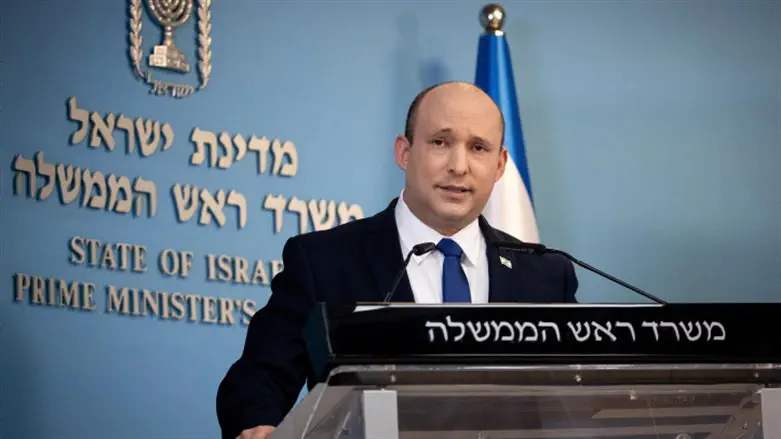
Prime Minister Naftali Bennett addressed the negotiations over Iran's nuclear program in Vienna at the start of the weekly Cabinet meeting Sunday.
"The first round of talks between Iran and the major powers in Vienna has ended without results. The Iranians, as expected, are proficient negotiators. They backtracked from previous agreements and came with a very strong and thuggish approach," Bennett said.
"An example of the nuclear blackmail that I spoke about: During the talks, we received reports that they had begun to enrich up to 20% purity in advanced centrifuges at Fordo. This is a very serious step. I call on every country negotiating with Iran in Vienna to take a strong line and make it clear to Iran that it is impossible to negotiate and enrich uranium at the same time.
"The Foreign Minister has returned from a round of talks in Europe on this issue and in the coming days, the Defense Minister and the Director of the Mossad will depart for Washington to continue dealing with the matter.
"Our goal is to utilize the window of opportunity that has opened between the rounds in order to tell our friends in the US: This is precisely the time to use a different toolkit against Iran's galloping forward in the enrichment sphere.
"Iran must start paying for its violations. The goal of the Iranian regime is the lifting of sanctions. For this they went to Vienna with dozens of advisors and sanctions experts, because this their goal: The ability to do what they are doing now regarding terrorism and in the nuclear sphere, only this time they want to be strengthened by tens of billions of dollars and a tailwind for all of their activity. We are holding an intensive dialogue on this matter with the Americans, the British, the French, Russia and others," Bennett concluded.
The US has signaled that its patience with Iran's stalling and continued push towards the development of nuclear weapons is beginning to run out.
On Saturday night, a State Department official told reporters: "As you all know, we’ve been waiting patiently for five and a half months. The Iranian Government said that it needed time to get ready to resume the talks on a mutual return to compliance with the JCPOA, and I think what we’ve seen over the last week or so is what getting ready meant for them. And more importantly, not only did we see it, I think our partners and others – Russia, China, others – have seen – have witnessed what Iran meant by getting ready."
"It meant continuing to accelerate their nuclear program in particularly provocative ways, and their latest provocation as reported by the IAEA only on Wednesday, i.e. while we were still in the middle of talks, was to prepare for the doubling of their production capacity of 20 percent enriched uranium at Fordow. What getting ready meant was to continue to stonewall the IAEA despite efforts – again, by all of the P5+1 – constructive efforts to find a way forward between Director General Grossi and Iran.
The official added: "Secretary Blinken has said we can’t accept a situation in which Iran accelerates its nuclear program and slow-walks its nuclear diplomacy. That’s not a situation with which we or others can live. So – and I – in terms of the next steps, I think what’s clear is that – again, and we’ve heard this not just from our traditional partners, we’ve heard this from the Russians, we’ve heard this from the Chinese, we certainly have heard it from the GCC countries when a U.S. delegation visited there not long ago – the world is prepared to support a mutual return to compliance by both sides. The world is prepared even to engage economically with Iran and diplomatically with Iran. But for that, Iran has to show seriousness at the table and be prepared to come back in short order in compliance with the deal, as the U.S. has said that it is prepared to do and as President Biden has said he prepared to do and to stay in compliance with the deal as long as Iran is."

